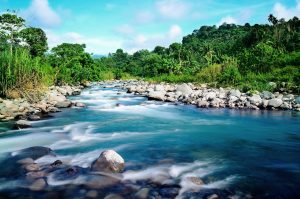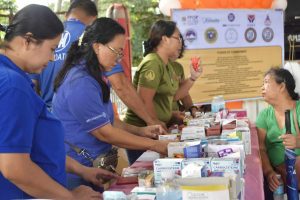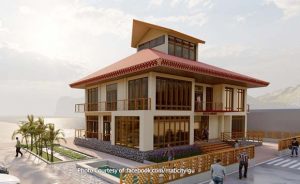
DAVAO CITY – The Tamugan River is woven into the history and identity of Davao, serving as one of its vital water sources. It has nurtured early communities, supported agriculture and livelihood, and contributed to the health and wellness of local residents. .
As Davao City grew into a vibrant urban center, the river remained essential, now serving as a key source of surface water through the Davao City Bulk Water Supply Project (DCBWSP). This initiative, a collaboration between the Davao City Water District (DCWD) and Apo Agua Infrastructura, Inc. (Apo Agua) has significantly enhanced the city’s water supply.
Since last February, the DCBWSP has delivered safe, reliable, and sustainable water to over one million Davaoeños, reducing the city’s reliance on groundwater sources, and paving the way for further economic growth.
Guardians of the Waters: IP Volunteers
The health of Davao’s rivers, including the Panigan-Tamugan River, is protected by dedicated volunteers from indigenous communities such as the Obu-Manuvu, Bagobo-Klata, and Ata.
This initiative began with youth volunteers known as Bantayo Awaeg (Water Guardians), who lead efforts in water quality monitoring. Every month, these committed individuals conduct community-based water monitoring, ensuring the water remains clean and safe.
This long-standing commitment by indigenous youth underscores the deep connection between the local communities and their natural resources. Now expanded to include Bantay Bukid volunteers, this effort is crucial in maintaining the quality of the Tamugan River, ensuring it continues to be a reliable source of drinking water. .
Geared Towards Environmental Initiatives
The preservation of the Panigan-Tamugan watershed is a crucial environmental initiative aimed at protecting the area’s delicate ecosystem. Reforestation has been identified as a key strategy to safeguard the watershed, and a tripartite reforestation program has been finalized to achieve this goal. Initiated almost a year before its finalization, the program focuses on planting trees and rehabilitating the watershed to safeguard it for future generations.
The importance of reforestation in this area cannot be overstated. The watershed is a vital source of water and supports a diverse range of plant and animal life. However, the area has been degraded over time due to human activities such as deforestation and land conversion. The reforestation program aims to restore the natural habitat of the area and preserve the watershed for future generations.
In addition to the tripartite reforestation program, tree-planting initiatives have also been sponsored along the Panigan and Tamugan Rivers, further emphasizing the commitment to environmental conservation.
These reforestation programs include understanding the closed and open canopy systems, critical factors in its success. Closed canopy systems, which do not receive sunlight, are not suitable for reforestation, whereas open areas, which do receive sunlight, can be effectively reforested. The plan to enrich the area with cacao trees aims not only to preserve the watershed but also to provide a sustainable source of income for the local community.
The Tamugan River is more than just a water source—it is a lifeline for both Davaoenos and the environment. The ongoing efforts to protect and preserve this water source will ensure that it continues to sustain life for generations to come.



